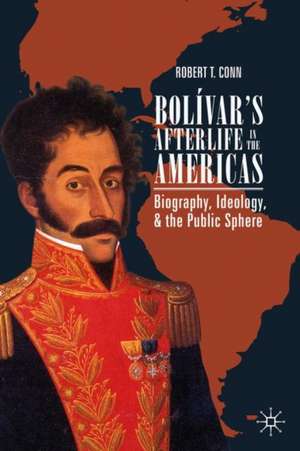Bolívar’s Afterlife in the Americas: Biography, Ideology, and the Public Sphere
Autor Robert T. Connen Limba Engleză Hardback – 2 apr 2020
| Toate formatele și edițiile | Preț | Express |
|---|---|---|
| Paperback (1) | 650.37 lei 6-8 săpt. | |
| Springer International Publishing – 26 aug 2021 | 650.37 lei 6-8 săpt. | |
| Hardback (1) | 654.95 lei 6-8 săpt. | |
| Springer International Publishing – 2 apr 2020 | 654.95 lei 6-8 săpt. |
Preț: 654.95 lei
Preț vechi: 770.53 lei
-15% Nou
Puncte Express: 982
Preț estimativ în valută:
125.33€ • 131.18$ • 104.31£
125.33€ • 131.18$ • 104.31£
Carte tipărită la comandă
Livrare economică 31 martie-14 aprilie
Preluare comenzi: 021 569.72.76
Specificații
ISBN-13: 9783030262174
ISBN-10: 3030262170
Pagini: 536
Ilustrații: X, 525 p.
Dimensiuni: 148 x 210 mm
Greutate: 0.82 kg
Ediția:1st ed. 2020
Editura: Springer International Publishing
Colecția Palgrave Macmillan
Locul publicării:Cham, Switzerland
ISBN-10: 3030262170
Pagini: 536
Ilustrații: X, 525 p.
Dimensiuni: 148 x 210 mm
Greutate: 0.82 kg
Ediția:1st ed. 2020
Editura: Springer International Publishing
Colecția Palgrave Macmillan
Locul publicării:Cham, Switzerland
Cuprins
1. An Introduction.- 2. Toward a Usable Narrative.- 3. Bolívar in Nineteenth-Century Venezuela.- 4. José Marti and Venezuela: Redressing Bolivarian Doctrine.- 5. From Liberalism to Positivism: Gil Fortoul and Vallenilla Lanz.- 6. Rufino Blanco Fombona: An Exile in Spain.- 7. The Construction of a Patrician Heritage and of Calumny: Vicente Lecuna, La Casa Natal, El Archivo del Libertador, and the Bolivarian Society.- 8. Revising the Bolivarian Machine: A Venezuela Reclaimed by New Intellectuals.- 9. Pan Americanism Above Ground: Bolívar in the United States.- 10. A Rebirth.- 11. Bolívar in the Wake of World War II: Gerhard Masur and Waldo Frank.- 12. The Bolívar-Santander Polemic in Colombia: Germán Arciniegas and Gabriel García Márquez.- 13. Bolívar and Sucre in Ecuador: A Case of Two Assassinations.- 14. Vasconcelos as Screenwriter: Bolívar Remembered.- 15. Bolívar in Bolivia: On Fathers and Creators.- 16. Institution Building in Peru: Ricardo Palma and Víctor Andrés Belaúnde.- 17. Bolívar in the Río de la Plata.- 18. Epilogue.
Recenzii
“Bolívar’s Afterlife in the Americas offers a rewarding and erudite overview of the political narratives that have framed politics in the region since liberation. It also serves as a warning: Read historical biographies with care.” (Oliver Balch, Americas Quarterly, January 13, 2020)
Notă biografică
Robert T. Conn is Professor of Spanish and Latin American Studies at Wesleyan University. He is the author of The Politics of Philology: Alfonso Reyes and the Invention of the Latin American Literary Tradition.
Textul de pe ultima copertă
Simón Bolívar is the preeminent symbol of Latin America and the subject of seemingly endless posthumous attention. Interpreted and reinterpreted in biographies, histories, political writings, speeches, and works of art and fiction, he has been a vehicle for public discourse for the past two centuries. Robert T. Conn follows the afterlives of Bolívar across the Americas, tracing his presence in a range of competing but interlocking national stories. How have historians, writers, statesmen, filmmakers, and institutions reworked his life and writings to make cultural and political claims? How has his legacy been interpreted in the countries whose territories he liberated, as well as in those where his importance is symbolic, such as the United States? In answering these questions, Conn illuminates the history of nation building and hemispheric globalism in the Americas.
Caracteristici
Examines the afterlives of Simón Bolívar in the Americas, focusing on Venezuela, Colombia, the United States, Peru, Ecuador, Bolivia, Argentina, Mexico, and Cuba Studies Bolívar as a rich site for questions of political and cultural identity, nationalism, race, and governance Appeals to scholars and students of Latin American history, culture, and politics
